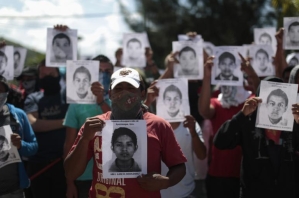
On Monday, four additional arrests led Mexican authorities to the town of Cocula, Guerrero where a twelfth clandestine burial site was discovered. The families of 43 students missing from nearby Iguala are demanding answers from the Mexican government as the unearthing of another mass grave is unveiling years of terror by corrupt police and government officials working for the drug cartel.
Missing since September 26, the students were victims of the Iguala police and Guerreros Unidos, or Warriors United, a murderous gang. Authorities believe the attack was ordered by José Luís Abarca, the mayor of Iguala, who fled just days after the incident with his wife, Maria de los Angeles Pineda, and the city's police chief, according to Fox News Latino.
On Sept. 26, as buses were headed out of the farming town of Iguala, unarmed students from the Rural Normal School of Ayotzinapa were ambushed. The vehicles were sprayed with bullets, some students attempted to fend off their attackers by throwing rocks, and none have been seen since. Over the past month, nearly 60 people with ties to the Guerreros Unidos have been arrested in relation to their disappearance.
Protestors in New York City marched on the Mexican consulate to urge the Mexican government - specifically President Enrique Peña Nieto - to aggressively address the kidnappings. And as the details surrounding the kidnapping unfold, tales of Guerrero's severe corruption have reached the national stage.
"It's been one of those places where horrible things are going on but you never know what it is," Adam Isacson, a senior associate for Regional Security Policy at the Washington Office on Latin America, told Fox News Latino. "Even before Mexico became one of the most violent places on earth, Guerrero had a very high murder rate."
Related: Forty-Three Students, Teachers Still Missing from Rural Mexican City
Since 2007, the drug war has claimed the lives of more than 100,000 people nationally. And Guerrero is being revealed as one of the biggest cartel body depositories in the country.
In the farming hills of the small southern state, the drug cartel grows opium poppies for heroin to be sold in the U.S. The large profits garnered from these sales have given Guerreros Unidos the power to pay off government officials to ignore the rise in missing persons, murders and mass graves.
While the whereabouts of the city's police chief, the mayor and his wife - who has familial connections to the gang - remain unknown, Mexican authorities believe they were in the very deep pockets of Guerreros Unidos. According to the New York Times, a gang leader currently in custody claims that Piñeda was "the main operator of criminal activities" in Iguala and received payments of up to 3 million pesos, or $220,000, at least monthly, to pay the police force to turn their heads to criminal activity.
This allegation puts the presidency of Peña Nieto in a much different light than he had campaigned and hoped for. Elected in 2012, he promised to reduce the cartel killings in Mexico, and focus on the economy, according to a report from Reuters.
Just one week after the kidnappings, he said in a televised address to the nation, "This is infuriating, painful and unacceptable." But after a full month has passed with no sign of the 43 missing students, Peña Nieto is scheduled to meet with families of the missing students in Mexico City today, according to the New York Times.
As many questions remained unanswered - and protests have erupted in Mexico City and New York City - Guerrero's governor, Ángel Aguirre, was forced to resign last week. He has been replaced by interim governor, Rogelio Ortega Martínez, a 59-year-old former university administrator with close ties to the Democratic Revolution Party.
The resignation of the governor may quell unrest temporarily but the government remains highly untrusted based on past history. "Organized crime strategies in the state always seem to involve the mayor and the police chief," Isacson said. "Sometimes they are even the capos of the gangs."
Mexican authorities continue searching for the students - spurred on partially by the violent protests in Mexico City and locally, where protestors burned a state building in the capital city of Chilpancingo.
To date, none of the bodies discovered around the state have been identified as those of the missing students.






